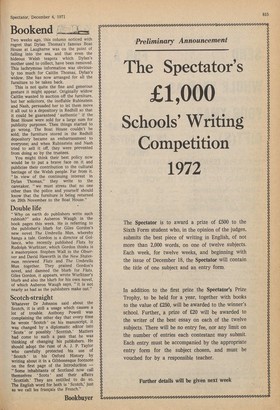Bookend
Two weeks ago, this column noticed with regret that Dylan Thomas's famous Boat House at Laugharne was on the point of falling into the sea, and that even the hideous Welsh teapots which Dylan's mother used to collect, have been removed. This lachrymose information was obviously too much for Caitlin Thomas, Dylan's widow. She has now arranged for all the furniture to be taken back.
This is not quite the fine and generous gesture it might appear. Originally widow Caitlin wanted to auction off the furniture, but her solicitors, the ineffable Rubinstein and Nash, persuaded her to let them move it all out to a depository in Redhill so that it could be guaranteed ' authentic ' if the Boat House were sold for a large sum for publicity purposes. Then things started to go wrong. The Boat House couldn't be sold; the furniture stored in the Redhill depository became an embarrassment to everyone; and when Rubinstein and Nash tried to sell it off, they were prevented from doing so by the trustees.
You might think their best policy now would be to put a brave face on it and publicise their contribution to the cultural heritage of the Welsh people. Far from it. "In view of the continuing interest in Dylan Thomas," they write to the caretaker, "we must stress that no one other than the police and yourself should know that the furniture is being returned on 29th November to the Boat House."
Double life • "Why on earth do publishers write such rubbish?" asks Auberon Waugh in the book pages this week. He is referring to the publisher's blurb for Giles Gordon's new novel The Umbrella Man, whereby hangs a tale. Gordon is a director of Gollancz, who recently published Flats by Rudolph Wurlitzer, which Gordon thinks is a masterpiece. Stephen Wall in the Observer and David Haworth in the New Statesman reviewed Flats and The Umbrella Man together. They praised Gordon's novel, and damned the blurb for Flats. Giles Gordon, it appears, wrote Wurlitzer's blurb and also the blurb for his own novel, of which Auberon Waugh says, "it is not nearly as bad as the publishers make out."
Scotch-straight
Whatever Dr Johnson said about the Scotch, it is still a usage which causes a lot of trouble. Anthony Powell was complaining the other day that every time he wrote ' Scotch ' on his manuscript, it was changed by a diplomatic editor into ' Scots ' or possibly 'Scottish.' Matters had come to such a pass that he was thinking of changing his publishers. He should adopt the ruse of A. J. P. Taylor who carefully protected his use of ' Scotch ' in his Oxford History by writing about it in a Gibbonesque footnote on the first page of the Introduction — "Some inhabitants of Scotland now call themselves ' Scots ' and their affairs Scottish.' They are entitled to do so. The English word for both is 'Scotch,' just as we call les frangais the French."
Bookbuyer










































 Previous page
Previous page